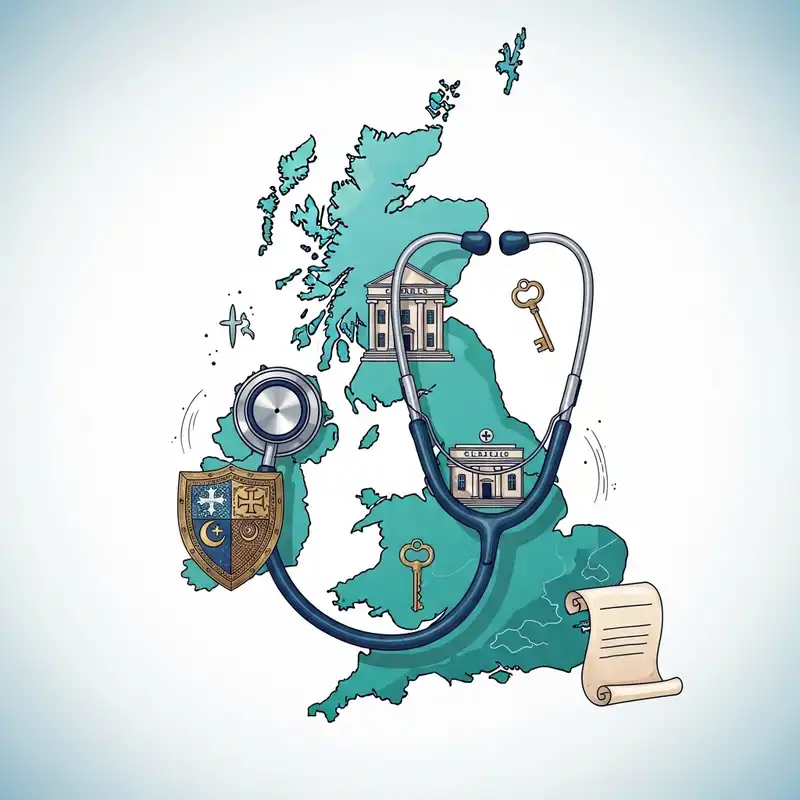TL;DR
We aim for promotions, learn new skills, launch businesses, and nurture our families. This constant push for personal growth is the engine of a fulfilling life. We build emergency funds, dutifully setting aside three to six months of expenses, believing this buffer is the ultimate safety net.
Key takeaways
- Illustrative estimate: Meet Alex, a 38-year-old self-employed electrician. Alex is a high earner and has conscientiously built an emergency fund of £20,000. He feels secure.
- The Accident: A fall from a ladder results in a complex fracture and nerve damage to his hand. He is told he won't be able to work for at least 12 months, and may never regain the fine motor skills needed for his trade.
- The Financial Drain: His emergency fund covers his mortgage and bills for the first seven months. But after that? His income is zero. The financial pressure mounts, causing immense stress that hinders his recovery. His plans to train an apprentice and expand his business are not just delayed; they are completely shattered. The mental toll is as devastating as the physical injury.
- Physiological Needs (Food, water, shelter)
- Safety Needs (Personal security, employment, health, property)
Beyond Emergency Funds the Unseen Architecture of True Personal Growth
We spend our lives striving. We aim for promotions, learn new skills, launch businesses, and nurture our families. This constant push for personal growth is the engine of a fulfilling life. We build emergency funds, dutifully setting aside three to six months of expenses, believing this buffer is the ultimate safety net. But what if that net has holes?
An emergency fund is a fantastic start, but it's fundamentally a reactive tool for short-term crises. True, unshakeable personal growth requires something more profound: a proactive architecture of financial safety. This isn't about simply surviving a storm; it's about building a fortress so strong that you can dance in the rain, confident that your foundations will never crumble.
Imagine having the mental space to pursue that master's degree, launch your freelance career, or take a sabbatical to write a novel, without the nagging fear of "what if?" What if you got ill? What if an accident stopped you from working? This is where financial protection insurance transcends its traditional role. It becomes an enabler, a silent partner in your personal development journey.
This guide explores that unseen architecture. We will delve into how robust protection, from income protection tailored for hands-on professionals like nurses and electricians to critical illness cover that provides a crucial financial cushion, gives you the ultimate permission to thrive. It’s about creating a reality where even a sobering statistic – like the fact that 1 in 2 people in the UK will be diagnosed with cancer in their lifetime, according to Cancer Research UK – doesn't have to derail your ambitions. It’s about building a life where you are free to focus on what truly matters: becoming the best version of yourself. (illustrative estimate)
The Limits of the Emergency Fund: Why Your Life Raft Needs a Coast Guard
Let's be clear: an emergency fund is non-negotiable. It's the first pillar of financial resilience, your immediate go-to for a broken boiler, an unexpected car repair, or a short-term job loss. It's your financial life raft.
But a life raft has its limits. It's designed to keep you afloat for a while, not to get you across the ocean. A serious illness, a long-term injury, or a critical diagnosis can create a financial tsunami that will overwhelm even the most diligently saved-for fund in a matter of months.
Consider the numbers. The average UK household's monthly expenditure, excluding mortgage payments, is significant. A £15,000 emergency fund, which would be a commendable achievement for most, might only last six to eight months. But recovery from a serious illness or the inability to work can last much, much longer. (illustrative estimate)
The Reality of Long-Term Sickness
According to the Office for National Statistics (ONS), long-term sickness is a primary reason for economic inactivity in the UK, affecting millions of working-age adults. The duration of such absences often extends far beyond the capacity of a standard emergency fund.
Let's look at a hypothetical but realistic scenario:
- Illustrative estimate: Meet Alex, a 38-year-old self-employed electrician. Alex is a high earner and has conscientiously built an emergency fund of £20,000. He feels secure.
- The Accident: A fall from a ladder results in a complex fracture and nerve damage to his hand. He is told he won't be able to work for at least 12 months, and may never regain the fine motor skills needed for his trade.
- The Financial Drain: His emergency fund covers his mortgage and bills for the first seven months. But after that? His income is zero. The financial pressure mounts, causing immense stress that hinders his recovery. His plans to train an apprentice and expand his business are not just delayed; they are completely shattered. The mental toll is as devastating as the physical injury.
Alex’s story illustrates the critical flaw in the 'emergency-fund-only' approach. It’s a finite resource facing potentially infinite challenges. Protection insurance acts as the coast guard in this analogy. While your life raft keeps you afloat, the coast guard is the powerful, long-term solution that actively comes to your rescue, providing the resources you need to get back to shore and rebuild.
The Core Pillars: Your Proactive Financial Shield
True financial architecture is built on several key pillars, each designed to protect a different aspect of your life. When they work together, they create a comprehensive shield that gives you the confidence to take calculated risks and pursue your ambitions.
Pillar 1: Income Protection (IP) – The Guardian of Your Lifestyle
If your ability to earn an income is your most valuable asset, then Income Protection is the insurance that protects it. It’s arguably the most crucial policy for any working adult, yet it remains one of the least understood.
What is it? Income Protection pays out a regular, tax-free monthly income if you are unable to work due to any illness or injury. It continues to pay out until you can return to work, reach retirement age, or the policy term ends, whichever comes first.
It's not for a specific list of illnesses; it's for the inability to work. This is a critical distinction.
Why is it vital for Nurses, Electricians, and the Self-Employed?
For many, Statutory Sick Pay (SSP) is the only safety net provided by an employer. As of 2025, SSP is a modest sum, barely enough to cover the average weekly grocery shop, let alone a mortgage or rent.
| Support System | Typical Weekly Payout (2025) | Duration | Notes |
|---|---|---|---|
| Statutory Sick Pay (SSP) | Approx. £116 | Up to 28 weeks | Paid by employer; not available to many self-employed. |
| Income Protection | 50-70% of gross salary | Until return to work or policy end | Tax-free payout; tailored to your income. |
For professionals in physically demanding roles, the risk is elevated.
- Nurses are on their feet all day, face immense physical and mental stress, and have a higher risk of musculoskeletal injuries.
- Tradespeople like electricians and plumbers rely on their physical health to do their job. A back injury or a broken wrist isn't an inconvenience; it's a complete stop to their earnings.
- Freelancers and the Self-Employed have no access to SSP. For them, a day not working is a day not earning. Income Protection is their sick pay, their holiday pay, and their peace of mind rolled into one.
By securing your monthly income, IP does more than just pay the bills. It removes the primary source of stress during a health crisis, allowing you to focus 100% on your recovery. This is the freedom that allows you to get back to your life and your growth journey faster.
Pillar 2: Critical Illness Cover (CIC) – The Lump Sum for Life's Biggest Hurdles
While Income Protection shields your monthly cash flow, Critical Illness Cover provides a powerful, one-off financial intervention when you need it most.
What is it? CIC pays out a tax-free lump sum on the diagnosis of a specific, pre-defined serious illness, such as some forms of cancer, a heart attack, or a stroke. Policies cover a wide range of conditions, and the quality of a plan is often determined by the breadth and definition of these conditions.
With the sobering statistic from Cancer Research UK that 1 in 2 of us will face a cancer diagnosis, the relevance of CIC becomes starkly clear. Similarly, the British Heart Foundation highlights that there are over 100,000 hospital admissions for heart attacks in the UK each year. These are not remote possibilities; they are mainstream health events. (illustrative estimate)
How does CIC fuel personal growth? The lump sum is yours to use as you see fit. This flexibility is its greatest strength. It creates options where previously there were none.
| Potential Use of CIC Payout | Impact on Personal Growth |
|---|---|
| Clear the mortgage/major debts | Removes the largest financial burden, drastically reducing stress. |
| Fund private medical treatment | Accesses cutting-edge treatments or second opinions without delay. |
| Adapt your home | Instals a ramp or stairlift, allowing for comfortable recovery at home. |
| Fund a career change | Allows you to retrain for a less stressful, more fulfilling career post-recovery. |
| Replace a partner's income | Enables your partner to take time off work to support you. |
Imagine being diagnosed with a serious illness. Now imagine it again, but this time your mortgage is gone. The weight that lifts is immense. That mental freedom is the space where healing accelerates and where you can begin to think about 'what's next?' on your own terms, not out of financial desperation.
Pillar 3: Life Insurance – The Legacy of Peace of Mind
Life Insurance is the foundational pillar, providing security for your loved ones in the event of your death. Knowing they will be financially secure is a profound comfort that frees you to live your life more fully.
- Term Life Insurance: This is the most common form. It pays out a lump sum if you die within a set term (e.g., the length of your mortgage). It's designed to clear debts and provide a financial cushion for your family.
- Family Income Benefit (FIB): A variation of term insurance, FIB pays out a regular, tax-free income to your family until the policy term ends, rather than a single lump sum. This can be easier to manage and replaces your lost income in a more structured way.
The connection to personal growth here is subtle but powerful. Worrying about your family's future is a significant cognitive load. By putting a robust Life Insurance plan in place, you offload that worry. You can take career risks, start a business, or invest in yourself, knowing that your dependents are protected no matter what.
For high-net-worth individuals, a specialised policy like Gift Inter Vivos insurance can be a savvy estate planning tool. If you gift a large sum of money or an asset, it may be subject to Inheritance Tax if you pass away within seven years. This policy pays out a lump sum to cover that potential tax bill, ensuring your gift is received in full by your loved ones.
Pillar 4: Private Medical Insurance (PMI) – Your Fast-Track to Health
In an ideal world, healthcare would be instant and seamless. In reality, the NHS, despite its incredible work, is facing unprecedented pressure. NHS England data from 2025 regularly shows millions of people on waiting lists for consultant-led treatment. Waiting for a diagnosis or treatment is not just physically uncomfortable; it's a period of profound uncertainty and anxiety that puts life on hold.
What is it? PMI is a policy that pays for the cost of private medical care, from diagnosis to treatment. Its primary benefit is speed.
- Bypass Waiting Lists: Get a diagnosis and start treatment in days or weeks, not months or years.
- Choice: Choose your specialist, your hospital, and the time of your appointments.
- Comfort: Access to private rooms, better facilities, and more flexible visiting hours.
For a self-employed person, a freelancer, or a business director, a six-month wait for a knee operation isn't just a health issue; it's a business crisis. For someone focused on personal growth, that's six months of their life and ambition stuck in limbo.
PMI is the ultimate health accelerator. By getting you diagnosed and treated quickly, it minimises disruption to your life, your career, and your personal development goals. It puts you back in control of your health and your time.
The Psychological Dividend: How Financial Safety Fuels Human Potential
The real magic of this protective architecture isn't just financial. It's psychological. By systematically de-risking your life, you unlock vast reserves of mental and emotional energy that can be redirected towards growth.
This idea is beautifully illustrated by Abraham Maslow's famous "Hierarchy of Needs." Maslow theorised that humans must satisfy their foundational needs before they can pursue higher-level growth and "self-actualisation."
- Physiological Needs (Food, water, shelter)
- Safety Needs (Personal security, employment, health, property)
- Love and Belonging (Friendship, family)
- Esteem (Respect, self-esteem, recognition)
- Self-Actualisation (The desire to become the most that one can be)
An emergency fund helps with the most basic level of Safety Needs. But a comprehensive protection plan—covering your income, health, and life—cements that entire level. It builds a wide, stable platform from which you can confidently reach for esteem and self-actualisation.
Reducing Cognitive Load
Worry is a thief. It steals your focus, drains your creativity, and paralyses your decision-making. The constant, low-level anxiety of "what if I can't pay the mortgage?" or "what if I get sick?" creates a significant "cognitive load."
When you remove that load with a proper safety net, you free up your brainpower.
- You can think more creatively about a business problem.
- You have the mental energy to study for a new qualification in the evenings.
- You feel more confident taking the leap into a new, more challenging role.
This isn't about eliminating risk. Life will always have risks. It's about intelligently managing the financial consequences of those risks, so you are free to embrace the healthy, growth-oriented risks that move your life forward.
For the Entrepreneurial Spirit: Specialised Shields for Business Owners
If you're a company director, a small business owner, or a key partner, your personal financial health is often deeply intertwined with the health of your business. A crisis for one is a crisis for the other. Specialised business protection is therefore not just a corporate strategy; it's an essential part of your personal financial architecture.
At WeCovr, we often advise business owners on a trio of essential policies that protect both their company and their personal wealth.
Key Person Insurance
What is it? This is a policy taken out by the business on the life or health of a 'key person' – an individual whose loss through death or critical illness would have a devastating financial impact on the company. This could be a founder with the vision, a top salesperson, or a technical expert.
The policy pays a lump sum to the business. This money can be used to:
- Recruit and train a replacement.
- Clear business loans or reassure lenders.
- Replace lost profits during the period of disruption.
- Fund a managed wind-down of the business if necessary.
By protecting the business, you are indirectly protecting your own investment, your income, and the livelihoods of your employees.
Executive Income Protection
What is it? This is a superior form of Income Protection that a limited company can purchase for its directors and salaried employees. The premiums are paid by the business and are typically treated as an allowable business expense.
The policy pays out to the company, which then continues to pay the director's salary through payroll. It offers higher levels of cover and more generous terms than most personal plans, providing robust income security for the business's most valuable people.
Relevant Life Cover
What is it? This is a tax-efficient death-in-service policy for individual employees, including directors. It's a way for a small business to offer the kind of life insurance benefit usually only available at large corporations.
- The company pays the premiums, which are generally an allowable business expense.
- It's not treated as a P11D benefit-in-kind, so there is no extra tax for the employee.
- The payout is made into a discretionary trust, so it typically doesn't form part of the individual's estate for Inheritance Tax purposes.
For a company director, this is an extremely efficient way to secure significant life cover for their family, using company funds rather than post-tax personal income.
This suite of business protection ensures that a personal health crisis doesn't automatically become a corporate catastrophe, safeguarding your life's work and the financial security it provides.
Your First Line of Defence: A Holistic Approach to Wellbeing
While insurance is your financial backstop, your daily habits are your first line of defence. A proactive approach to your health can reduce your risk of needing to claim and can even lead to lower insurance premiums. True wealth is health, and it's a core part of the growth mindset.
Because we believe that proactive health management and financial protection are two sides of the same coin, WeCovr provides our clients with complimentary access to our exclusive AI-powered calorie and nutrition tracking app, CalorieHero. It's our way of supporting your entire wellbeing journey.
Here are some actionable tips for building a healthier, more resilient you:
1. Nourish Your Body and Mind:
- Balanced Diet: Aim for a diet rich in whole foods, fruits, vegetables, lean proteins, and healthy fats. The NHS 'Eatwell Guide' is an excellent resource for visualising a balanced plate.
- Hydration: Proper hydration is crucial for cognitive function, energy levels, and overall health. Aim for 6-8 glasses of water a day.
- Mindful Eating: Pay attention to what and when you eat. Our CalorieHero app can help you understand your patterns and make healthier choices effortlessly.
2. Embrace Movement:
- Activity Guidelines: The NHS recommends at least 150 minutes of moderate-intensity activity (like brisk walking or cycling) or 75 minutes of vigorous-intensity activity (like running or tennis) a week.
- Strength Training: Include muscle-strengthening activities on 2 or more days a week. This is vital for maintaining bone density and metabolic health as you age.
- Find What You Love: The best exercise is the one you'll stick with. Whether it's dancing, hiking, swimming, or team sports, find an activity that brings you joy.
3. Prioritise Rest and Recovery:
- Sleep: Aim for 7-9 hours of quality sleep per night. Sleep is when your body repairs itself and your brain consolidates memories and learning. Poor sleep is linked to a host of chronic health issues.
- Digital Detox: Limit screen time before bed. The blue light from phones and tablets can interfere with your body's production of melatonin, the sleep hormone.
- Stress Management: Chronic stress is a major risk factor for many illnesses. Incorporate stress-reducing practices into your daily routine, such as mindfulness, meditation, deep breathing exercises, or simply spending time in nature.
Building these habits doesn't just make you healthier; it makes you more capable. You'll have more energy, better focus, and greater resilience, all of which are essential fuel for your personal growth journey.
Conclusion: Build Your Fortress, Then Reach for the Stars
An emergency fund is where your financial security journey begins, but it should never be where it ends. It's the gatehouse to your castle, not the fortress itself.
The unseen architecture of true personal growth is built upon a foundation of proactive, intelligent financial protection. It's the Income Protection that ensures a health setback doesn't become a financial catastrophe. It's the Critical Illness Cover that gives you the resources and breathing room to heal on your own terms. It's the Private Medical Insurance that gets you back on your feet faster, and the Life Insurance that gives you the profound peace of mind to live boldly.
This isn't about fear; it's about freedom. It's about neutralising the biggest financial "what ifs" so you can channel all your energy, creativity, and passion into the "what's next." It's the freedom to change careers, to start a family, to launch a business, or to simply know that you and the people you love are secure, no matter what life throws your way.
Navigating the world of protection insurance can feel complex, but you don't have to do it alone. An expert adviser can help you analyse your unique needs, compare plans from all the major UK insurers, and design a bespoke shield that fits your life and your ambitions.
Don't just build a life raft. Construct the fortress. Then, go out and build your empire.
Is the payout from Income Protection insurance tax-free?
What's the main difference between Life Insurance and Critical Illness Cover?
Do I really need protection insurance if I'm young and healthy?
How much cover do I actually need?
Can I get insurance if I have a pre-existing medical condition?
Sources
- Office for National Statistics (ONS): Mortality and population data.
- Association of British Insurers (ABI): Life and protection market publications.
- MoneyHelper (MaPS): Consumer guidance on life insurance.
- NHS: Health information and screening guidance.

































